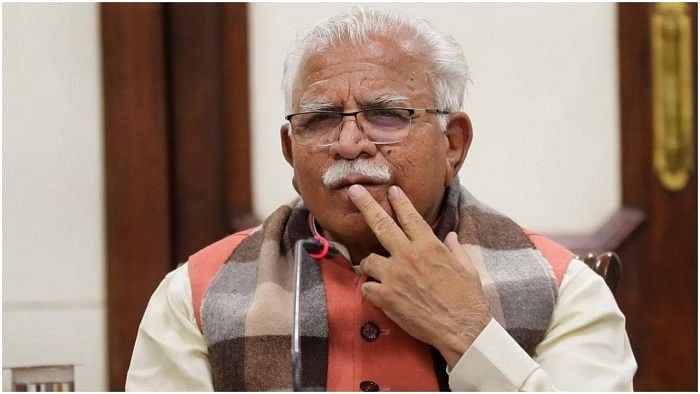
Haryana Chief Minister Manohar Lal Khattar.
Credit: PTI Photo
Chandigarh: Chief Minister Manohar Lal Khattar Saturday said Haryana now stands as a model state in stubble management, as he emphasised the recent Supreme Court verdict advising Punjab to learn from Haryana in checking farm fires.
Interacting with the state's farmers through audio conferencing during the 'CM ki Vishesh Charcha' programme, Khattar praised their efforts to reduce stubble burning incidents, according to an official release.
He said there has been a 36.4 per cent decrease in cases of stubble burning in Haryana, whereas Punjab saw a 27.1 per cent decline.
Citing a report by the Indian Council of Agricultural Research (ICAR), Khattar said until November 22, Haryana recorded 2,239 stubble burning cases, significantly lower than 36,118 such incidents in Punjab.
The state has taken several steps for stubble management, setting a unique precedent nationally by fixing a rate of Rs 2,500 per tonne for stubble purchase, the statement quoted him as saying.
Additionally, a provision has been made for an extra payment of Rs 500 per for stubble with less than 20 per cent moisture content, he added.
The chief minister further said a reward of Rs 1 lakh would be given to a gram panchayat that moves from the category of 'highly sensitive' village in terms of crop residue burning to the 'zero crop residue burning' category.
Similarly, panchayats that transition from sensitive villages to zero crop residue burning receive a Rs 50,000 reward, he said.
Khattar added that the 'Mera Pani Meri Virasat' scheme promotes low water-consuming crops by providing a grant of Rs 7,000 per acre for crop diversification in paddy fields. Around Rs 118 crore has been distributed under this initiative, leading to a reduction in stubble quantity.
Over 6,700 custom hiring centres have been established in the state since 2018 to prevent pollution caused by crop residue burning and farmers have received 80,071 crop residue management equipment, he added.
The state's farmers have received Rs 685 crore in subsidies so far. Farmers have purchased 6,130 machines on subsidy so far in the current fiscal year. To encourage the use of these machines, an incentive of Rs 1,000 per acre has been made for both in-situ and ex-situ management, said Khattar.
Khattar also shared the state's initiative in using stubble for the production of biofuel.
On August 10, 2022, Prime Minister Narendra Modi inaugurated the 2G ethanol Plant at Panipat Refinery, following which a 3G plant has also been established at the refinery.
He said the state government is in talks with African countries to explore opportunities for Haryana farmers to cultivate there, highlighting the state's diminishing agricultural land. Plans are in the works to make this initiative a reality, said Khattar.
The chief minister said the government extended support to farmers at every step, from sowing seeds in fields to selling produce in markets.
He highlighted that in July this year, floods affected 1,469 villages and 4 towns across 12 districts -- Ambala, Fatehabad, Faridabad, Kurukshetra, Kaithal, Karnal, Panchkula, Panipat, Palwal, Sonipat, Sirsa, and Yamunanagar.
The government provided full assistance to those affected by the floods, with compensation of Rs 112.21 crore disbursed to 34, 511 farmers for crop damage, including 49,197 acres replanted, he said.